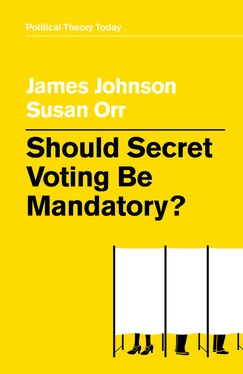Such sweeping concerns about the fate of democracy may seem distantly related to the question we pose in our title – “Should Secret Voting Be Mandatory?” However, when we examine extant systems of representative democracy, it becomes clear that they rest on a scaffolding of small-scale institutions – and that the mechanics of voting are a crucial example. As Robert Dahl (1998) notes, “free and fair” elections are integral to democratic politics. He insists we assess democratic arrangements in terms of their responsiveness to popular demands and interests while noting that elections are the most important mechanism for gauging those demands and interests. The caveat, of course, is that elections must facilitate inclusion and contestation – meaning that they must foster wide-ranging and equal participation so that an encompassing range of perspectives is considered.
All of that may seem a commonplace. If so, that is troubling because, as Freedom House also reports, confidence in elections has declined even more precipitously – indeed, twice as fast – than confidence in democracy more generally. Two broad responses, each theoretical and political at the same time, suggest themselves here. We might retrench and scale back our aspirations for democracy and adopt instead a more technocratic mode of politics. Alternatively, we might seek to expand and enhance popular participation.
Those who advocate the first response advise investing authority for political decision making in experts or elites who are insulated in various ways from seemingly hazardous popular pressures. They advise that we rely more completely on rulemaking in bureaucratic agencies, commissions staffed by ‘apolitical’ experts, constitutional courts beholden to narrow interpretive doctrines, central banks constrained by strict rules and automatic triggers, and so forth. They take advantage of popular dissatisfaction with democratic arrangements to propose an alternative that, they believe, will deliver both sounder policy and political stability. Their argument presumes that we can best operate politically by minimizing the scale and scope of popular participation.
Advocates of the second response are eager to revive democratic politics by promoting both participation and inclusiveness. Scholarship in this area was sparked by the publication of Robert Putnam’s Bowling Alone (2000), which documented a decline in civic engagement. In response to Putnam’s work, democratic theorists and policy makers launched studies to explore whether participation was truly in decline, and if so in what ways, and what practices and policies might redress such decline. Concern over diminishing voter turnout and inequities in voter participation comprised part of those studies. In response, an array of policies intended to increase turnout by making it more convenient to vote were introduced in multiple nations (Gronke et al. 2008). These policies – including postal voting, on-demand absentee balloting, early voting in person, and internet voting – aim to lower the “cost” of voting and thereby increase participation. They have become relatively common.
These responses to the retreat of democracy are by turns fatalist and naive. We reject the first and advocate a better way to accomplish the second. There are good general reasons to reject technocratic fatalism and to instead endorse a considerably more robust conception of democratic politics, including more inclusive popular electoral participation. Suffice to say here that we think both that elites and experts have themselves contributed to skepticism about democracy and that there are democratic ways to address that skepticism. We do not rehearse those general arguments here (Knight and Johnson 2011; Orr and Johnson 2019). Instead, we follow those who seek more robust democratic participation but argue for a more effective route to that end. Rather than making voting more convenient, we advocate that voting in person by secret ballot be made compulsory.
Our proposal resists fatalism yet aims to infuse some realism into proposals for increasing participation. Flatly, we oppose widespread adoption of policies that make voting more convenient. Why? First, there is little evidence that such initiatives expand participation in inclusive ways. But, more importantly, such measures threaten electoral integrity. It is not difficult to fathom how they might do so. They undermine ballot secrecy that was introduced to foreclose intimidation and bribery of voters – practices which are starting to reemerge. Consider vote-by-mail schemes. In recent elections in the United States and United Kingdom, for instance, between a fifth and a quarter of all votes were cast by mail. Imagine that your employer offers to witness your ballot and then mail it on your behalf. Or perhaps your landlord generously sends someone to collect your ballot along with your rent and requests you leave the former inside the unsealed envelope containing the latter. Perhaps you are an immigrant with limited language skills and a political party sends an operative to your door to help you complete your ballot. Or consider the partner or children of an abuser who demands the family sit together at the kitchen table to complete their ballots. These scenarios are hardly fanciful and we provide examples of such behavior in the text. Here the point simply is that the ways in which convenience-voting initiatives promise to encourage participation operate at odds with both inclusion and integrity.
If we hope to reinvigorate democratic politics, we should not make voting “convenient”; we should make it mandatory. Advocates of what commonly is called compulsory voting often endorse it as a way to increase participation that, since it requires all voters to go to the polls, also is inclusive. Such arguments are important. However, we focus our argument elsewhere. We support making voting mandatory because, in tandem with the secret ballot, it promotes electoral integrity. We argue that this can help offset declining confidence in democratic politics by dramatically expanding democratic participation in ways that recognize the intimate connections between inclusion and integrity in electoral politics. Simply put, we argue that voting must be both secret and mandatory.
We present our argument in three parts. In chapter 1, we address conceptual and theoretical matters. We introduce the idea of non-domination as our basic normative criterion. We then focus on the strategic structure of the secret ballot. We demonstrate how the secret ballot protects individuals from intimidation and bribery – what we call electoral domination – by restricting their ability to credibly reveal how they voted. As such, the protection that the secret ballot affords restricts individual freedom in one way in order to protect individuals from those who might seek to engage in electoral domination. We also underscore that voting secrecy effectively protects voters only when it is obligatory. That, in turn, requires that voting be controlled and administered by public officials.
In chapter 2, we relate the historical struggle to implement and refine ballot secrecy. Our account highlights the variety, efficacy, and limits of the institution. The design features and rules embodied in the most effective form of the secret ballot – in what is known as the “Australian ballot” – resulted from that historical struggle. They are intended to remedy lapses in secrecy when voting is left in the hands of private actors (e.g., party functionaries or their agents) rather than being controlled by public officials. We also establish how, historically, those bent on exercising electoral domination resort to attempting to buy or suppress turnout once the secret ballot has created an impediment to directly interfering with voting. Our first two chapters show why the secret ballot is necessary to protect voters from illicit interference as they seek to formulate and express their political preferences. They also show why the protections it affords are far from sufficient.
Читать дальше












